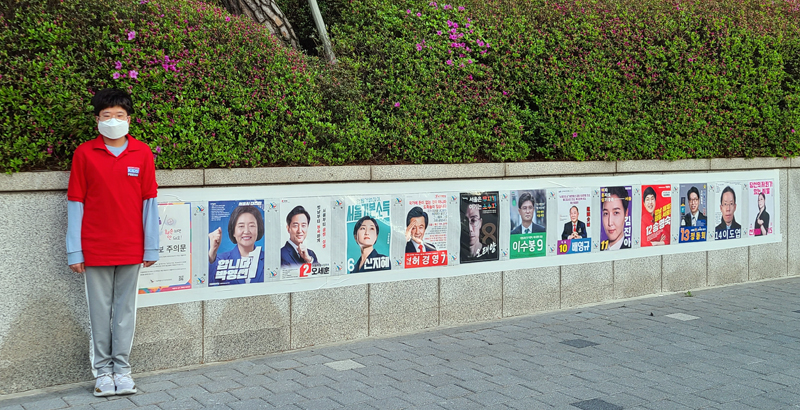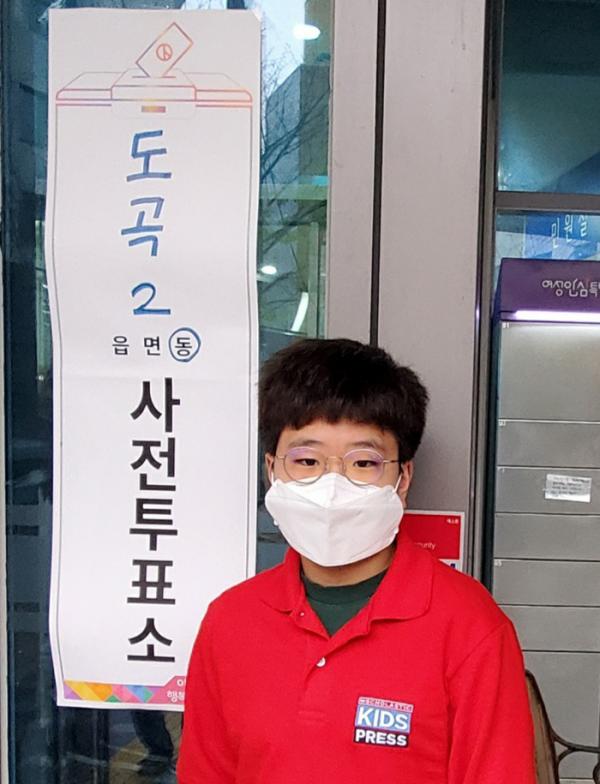KID REPORTERS’ NOTEBOOK
A Look at Two Mayoral Races in Korea


John stands in front of campaign posters for the leading mayoral candidates in the April 7 election in Seoul.
The role of mayor in South Korea’s two largest cities, Seoul and Busan, was on the line in two special elections held earlier this month. “By-elections” take place whenever a government seat has been left vacant due to a resignation, an illness, or a death.
Although a recent surge in COVID-19 cases here filled the elections with uncertainties, both contests ran smoothly. In Seoul, the capital of South Korea, 12 candidates ran. The two major parties, the People Power Party and the Democratic Party of Korea, garnered the most support.
“It was a clash of two political titans,” said Kim Sung-hee, a voter in the Gangnam district of Seoul.
Oh Se-hoon, who represents the conservative People Power Party, won the mayoral race in Seoul. The job is considered to be the second-most powerful in the country after that of the president.
The Busan election featured six candidates. Park Heong-joon, who also ran on the People Power Party ticket, defeated his more liberal opponents.
With the presidential election in South Korea less than a year away, the two mayoral races are seen as key indicators of the mood of voters. The current President, Moon Jae-in, represents the more liberal Democratic Party of Korea. His popularity has declined steeply in the past year due to charges of corruption.

John stands outside his local polling place in Seoul, where a sign gives directions for early voters.
CAMPAIGNING DURING THE PANDEMIC
After the mayoral candidates registered, a 13-day campaigning period followed. The candidates met voters in-person and online, adjusting to safety protocols put in place because of the pandemic.
“It was nice to be able to listen to how the candidates will change Seoul from the comfort of our homes,” Kim said.
The candidates had different solutions to the top concerns here, which include an economic downturn caused by the pandemic, political corruption, economic inequality, and a slow rollout of COVID-19 vaccines. The winning candidates argued for minimal government interference to allow the economy to rebound.
Unlike other elections, the by-elections were held over the course of three days. Since the elections were not nationwide, Election Day, April 7, was not designated as a national holiday. Voting proceeded from 6 a.m. to 8 p.m. on Election Day, ending at 6 p.m. on early voting days.
“I’m excited to still be able to vote,” said Joon-pyo Hong, who arrived from Dubai on April 6.
Voters in quarantine were allowed to arrive at the polls at designated times after 8 p.m. on Election Day to cast their ballots.
Oh won 57.5% of the vote in Seoul, and Park won by a margin of 62.67% in Busan. The results were not a surprise. Many polls during the campaign season had both winning candidates ahead by wide margins. Because the elections were for offices that had been left empty, the candidates were able to assume their new roles on April 8.
“I hope the Mayor is able to make a great Seoul for everyone,” said Hong, voicing his desire for huge improvements after a very rough year.
